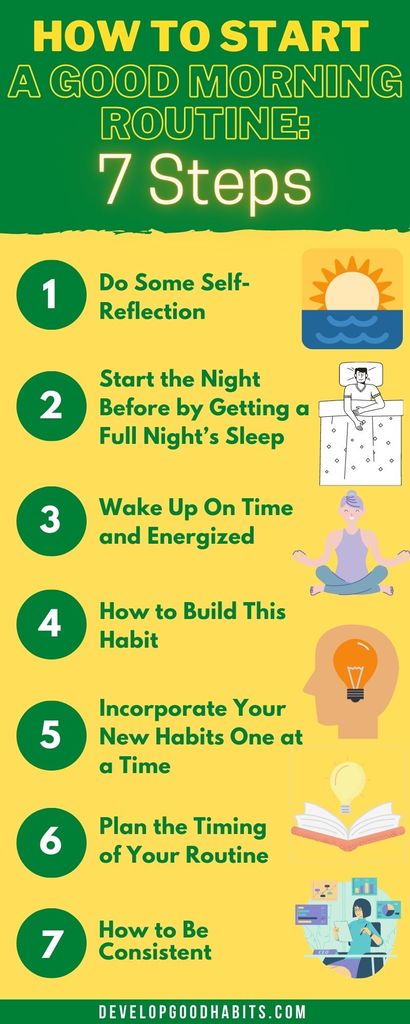Before I had a child, there was one thing that I really didn’t like about going on vacation–my morning routine had to be improvised.
Post-child, my whole life seems to be improvised for the time being, but I remember those days where I valued my morning routine so much that I would do whatever I could to make do with what I had during times when I wasn’t in my everyday environment.
And things certainly got creative, because if I didn’t do my morning routine, the entire day felt off.
Once school starts and life gets back on track, I’m really looking forward to getting back into the swing of things so I can start my days focused, energized, and grateful for “normalcy” (whatever that is).
In this article, we are going to talk about the benefits of having a morning routine for peak performance, and then go through a step-by-step guide that you can follow to create a routine that works for you.
But first, let’s look at why it’s important to have a personalized morning routine.
Why It’s Important to Have a Morning Routine
Research has consistently shown that adhering to a routine is associated with better health outcomes for both children and adults.
And if you’re used to having pretty busy days, your mornings may be your only daily constant and the only thing you can maintain complete control over.
You can designate this time for your own needs and self-care, regardless of what you have going on in your life.
When you’re able to wake up and do things that you’ve decided to do in advance because you really want to do them, you’re granting yourself the ability to start your day with intention. This positive sense of purpose will have a strong ripple effect on your mood and focus for the rest of the day.
In fact, a study completed by the American Psychological Association revealed that following a morning routine helps reduce one’s stress, anxiety, and symptoms of depression, while increasing levels of overall life satisfaction.
Chances are, once you have your morning routine down pat, you will notice an increased sense of motivation to get your everyday tasks done, plus, it will also help improve your physical health.
In fact, the world’s millionaires and billionaires complete a series of habits that start their day on the right foot. The video below talks about the 12 best morning habits you can use to increase your focus, motivation, and energy for the rest of the day.
Many people incorporate some type of physical exercise into their morning routine, whether that’s an intense workout or just doing some light stretching–but either way, your body will benefit.
Furthermore, according to research done by Northwestern University, people who are able to get up and go in the morning tend to eat fewer calories and more fruits and vegetables when compared with those who drag their feet when their alarm goes off.
Also, late risers tend to eat more fast food, which increases one’s risk of obesity and the health conditions that are associated with it.
Your morning routine will help you start off in a positive state of mind, which you can carry with you for the rest of the day.
Why Your Morning Routine Needs to Be Unique to You
There are so many examples of morning routines on the internet–it’s overwhelming. Should you follow the routine of someone who is really successful in an attempt to achieve the same success that they have?
Should you believe the “secrets” you see on pop-up ads that reveal the #1 thing top performers do every morning to be successful?
No. There is not one routine that works for everyone. The world would be pretty boring if there were. (But there are certain morning routine mistakes to watch out for.)
When it comes to your morning routine, consider the examples that you come across to be à la carte options, not a menu from which you need to choose just one in its entirety.
You can pick and choose which elements of the routines that you come across are valuable to you, depending on what your goals are and what you want more of in your life.
What is your intention for each day? Do you want to be in better physical health? Have more opportunities to focus on your spirituality? More time to read?
You will only gain the benefits of having a morning routine if yours aligns with what’s important to you.
What Does Every Morning Routine Entail?
While your morning routine needs to be personalized to your life and goals, there are some things that all morning routines should have in common.
Researchers have found that one of the most common components of a successful morning routine is its ability to be simple and straightforward. Aside from its simplicity, your morning routine will be most effective if it:
Keeping these things in mind, let’s look at 7 steps you can take to develop a morning routine that works for you.
A Step-by-Step Guide to Developing a Morning Routine That Works for You
1. Do Some Self-Reflection
You need to identify the things in life that are the most important to you so you can incorporate these subjects into your morning routine.
Your morning routine will include activities that support your goals, values, and the things that make you happy.

If you need help determining your values, here are five core value quizzes that can help you identify what they are.
When it comes to your goals, think about all of the areas of your life in which you set goals for yourself, then consider the types of things you want to get done on a daily, weekly, and monthly basis to help cater your morning routine to support your progress.
For example, if you have a daily goal to spend ten minutes stretching, go ahead and get that out of the way during your morning routine. Doing so will help you ensure that you’re successful in meeting these smaller goals each day that compound to ultimately help you achieve your bigger goals.
Lastly, think about the things that make you happy and do one of them every morning.
Maybe this is talking to your best friend on the phone or spending time in the backyard throwing a ball to your dog–or maybe enjoying an energy-boosting breakfast with your partner is something that you always look forward to doing. This component should be something relatively small that has a big impact on your mood.
If you have a vision board (which you should!), refer back to this work that you’ve already done to identify these important elements of your life. You can also do this by journaling every morning with the help of writing prompts.
Remember, the goal here is not to cover everything that is meaningful to you, as that would take much more time than you likely have before you need to get started with your day. Rather, try to address your keystone habits or those that focus on more than one of your goals.
2. Start the Night Before by Getting a Full Night’s Sleep
You want to be well-rested to prepare yourself to tackle any day. So, in addition to having a morning routine, create a night routine that helps calm your mind and prepare your body for sleep.
If you’re already on a good sleep schedule, that’s great–but if not, there are things you can do to fix this problem. Once you get in a routine, you will start to naturally fall asleep and wake up at the same time each day without even needing an alarm clock to wake you up in the morning.
If you have trouble falling asleep at night, here are 28 tools to help you improve your sleep hygiene, which will make it easier for your body to fall into a deep sleep at a reasonable hour. And, if you have trouble sleeping through the night, here are 41 tips to getting a better night’s sleep.
You can also help yourself out by doing some prep each night for the next morning. Lay out your workout clothes and whatever you’re planning on wearing the next day, pack your lunch and everything you need for work, and tidy up the house so you don’t get sidetracked cleaning dishes from the night before when you’re trying to get out the door the next morning.
I used to make my water bottle to take to the gym in the morning before I went to bed so I could just grab it and go (I start every day by drinking water, regardless of anything else I do–which I always include a few slices of lemon in), and I would mix my green juice powder at night as well so I could quickly re-stir it and enjoy it after the gym.
What you do the night before will be tailored to what your morning routine involves, but think about the things you can get done ahead of time (no matter how small it seems)–you will thank yourself in the morning.
3. Wake Up On Time and Energized
If you know about ego depletion, you know that we all wake up with the most motivation and willpower that we will have all day.
This is why being intentional about being productive in the morning can lead to so much success–the morning is the perfect time to really focus on the tasks that are important to you and be proactive about doing things to better your life (and this is only one of the benefits of waking up early).
As your motivation and self-control starts to run low, you become tired and tasks become increasingly cumbersome as your mood starts to go downhill.
This exhaustion of willpower kills your rate of productivity, which makes the morning, when your self-control is at its peak, the most critical hours of the day.
But the point here isn’t that you should get to work first thing in the morning–rather, it’s to do the right things during these productive hours that will help your motivation last as long as it can.
If you need some help at first getting an early start, here are 13 steps to help you wake up early. But, once you get into your routine, you will naturally wake up without having to rely on your alarm clock. And, the days of hitting the snooze button will be long gone, as you will wake up and be ready to roll.
Once you’ve conquered your basic need of getting the sleep that your body requires to work at its optimal level, you can start getting down to the nitty gritty of building your morning routine.

4. How to Build This Habit
What do your mornings look like right now? Are there some habits you want to keep doing? What are the things that you do that are holding you back from starting off the day on the right foot?
Get an idea of your dos and don’ts by reviewing your current behaviors and separating the good habits from the bad.
If you’re among the 57% of people who hit the snooze button each morning, you’re literally starting your day off by procrastinating. So, this would be an example of a bad habit that you’re probably not trying to carry over into your new morning routine.
Or, maybe your alarm goes off and you roll over, pick up your phone, and start checking your email. Or–you go straight for social media. These are both good ways to start your day off with the priorities and lives of other people instead of yourself.
If you’re like me, you can easily get lost in your phone, spending half an hour scrolling aimlessly and wasting time. When you eliminate things such as this from your morning routine, you give yourself so much time back to do more productive things.

For example, when I was in the swing of my most recent morning routine, I would wake up at 4:40 to be at the gym by 4:50 with the rest of the morning crew, waiting for the employees to unlock the doors at 5:00.
And, depending on who was working, we may get lucky and be let in at 4:56…which doesn’t seem like a big deal, but it could add another half mile to my run. So, it was.
This means that just 30 minutes after waking up, I would have driven to the gym and I would be about a mile (or mile and a half) into my run.
Alternatively, I could have spent that same 30 minutes scrolling through my phone before looking up at the clock, wondering where the time went.
You have to intentionally let go of these bad habits in the morning and, if you have to do them, save them for another time. Reserve your mornings exclusively for positive habits such as exercising, reading (real reading) things that you find interesting, doing daily journaling, meditating, etc.
5. Incorporate Your New Habits One at a Time
Now, you may feel super motivated right now to get started with this and revamp your entire morning, starting tomorrow. However, I would caution against doing this. Set aside your “all or nothing” attitude and take a gradual route in small, manageable increments of change.
Start replacing one or two of your current habits with new habits that you want to be a part of your morning routine. You don’t want to do a sudden overhaul of your routine in one day, as doing so could quickly overwhelm you and make you want to go back to your old ways.
While there are some instances in which you can introduce several new habits at once, creating your morning routine has the biggest chance of being successful if you do it one step at a time.
Working slowly into your new routine will also help you tweak your plans, if needed.
You may find that you have to rush to get everything that you initially wanted to accomplish finished in the time you have, and the last thing you want is to feel rushed during your routine or struggle to get out of the door on time.
You want your routine to be relaxed to set the tone for a laid back mindset for the rest of the day.
Once a habit starts to come naturally, add in another that makes sense. Creating your morning routine one step at a time will also help ensure that it ends up being a perfect fit in the end.
To do this, refer back to the practice of habit stacking, which will help you turn your new positive morning habits into a sequence of actions that’s easy to carry out.
6. Plan the Timing of Your Routine
With the activities that you want to include in your daily routine defined, you’ll want to consider the logistics of it next. Is your work schedule the same every day or do you start working at different times, depending on what day it is?
If your schedule is varied, focus on your sequence of events instead of exactly what time each activity needs to be done.
When you add in times to your morning to-do list, your routine will become exponentially more effective. Doing this will prevent you from procrastinating or rushing through things to complete everything within the time that you’ve allotted. Having a timeframe also shows you what is and isn’t feasible so you can prioritize your mornings accordingly.
When I had a strict morning routine, I had the “luxury” (in this case) to start work at the exact same time every day, so I would wake up at the same time every day and get started on my routine, all the while knowing about what time it was (depending on where I was in my routine).
This also made it really easy to tell if I was running behind and needed to pick up the pace a bit. For example, if I was just getting back from walking the dog at 8:10, I knew I had spent too long on something.
If you work a varied schedule, you can go through your routine at whatever pace works best for you, depending on the day. But either way, your routine should only take you about one to two hours to complete.
Remember, you’re trying to fit all of this in before even leaving for work, so it shouldn’t be a burden of any kind.
7. How to Be Consistent
The first step to being consistent with your routine is to make sure it’s one that you can manage and it clearly benefits you in some way.
If you feel rushed in the morning or your routine stresses you out (even a little), you’re not likely to stick to it.

However, over time, the things that are really important to you will naturally change. Your goals will evolve, as will your responsibilities and possibly even your values as you grow and go through the various seasons of life.
Your morning routine will be effective as long as it grows and evolves along with you, continuing to support your goals and success. As soon as something doesn’t make sense anymore, stop doing it. Try out some new habits until you find one that fits well into whatever your life looks like at the time.
It may help you to stay consistent on an everyday basis if you break the rules once in a while. If you’ve followed a routine for the entire month, don’t stress yourself out too much if you decide to take a weekend morning off to sleep in, splurge on a big breakfast, and do almost nothing productive at all.
An occasional interruption to your morning routine can be healthy–and chances are, you’ll be eager to get back to the structure that you’ve created and become accustomed to, which will help you further recognize how your routine is benefitting you.
Final Thoughts on a Morning Routine
The best morning routine is one that empowers you to feel ready to take on the rest of the day. Your morning routine won’t be identical to that of your spouse or best friend, because you each have unique goals, schedules, and preferences.
It will take some trial and error to perfect your morning routine, but once you figure out what works best for you, you will look forward to the time that you’ve set aside in the morning to focus solely on yourself and your needs.
You can gain some inspiration from other people’s morning routines–but, seeing as your needs aren’t identical to anyone else’s, make sure to tweak the ideas as needed.
Now that you’re equipped with the tools to set yourself up every day for success, give the steps in this guide a try, and remember to enact your changes gradually. And, before you know it, you will transform your mornings, which will overflow to benefit every other area of your life.
Ultimately, it’s important to recognize that if you want a more successful life–whatever that means to you–then you need to take the appropriate steps to get there, which could very well involve constructing a good morning routine.
Here are some more resources to help you craft the perfect morning routine:
Finally, if you want the perfect morning routine, then check out this seven-step process for creating a morning routine that will become a vital part of your daily life.)

Connie Mathers is a professional editor and freelance writer. She holds a Bachelor's Degree in Marketing and a Master’s Degree in Social Work. When she is not writing, Connie is either spending time with her daughter and two dogs, running, or working at her full-time job as a social worker in Richmond, VA.


